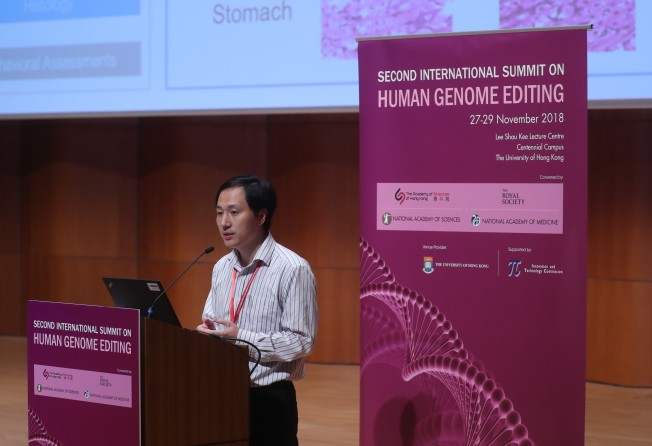Scientists line up to take aim at research behind Chinese biologist He Jiankui’s gene-edited babies
- Nobel laureate and leading American biologist David Baltimore says the work to make babies HIV immune was not medically necessary
- American biochemist David Liu, a co-inventor of the gene-editing technology used in the experiment said the children were at no risk of developing HIV anyway

Scientists lined up to criticise Chinese biologist He Jiankui on Wednesday as he sought to defend his work on what he says are the world’s first genetically edited babies.
He claimed earlier this week that twin girls had been born in China this month from two embryos he and a team of researchers had altered to protect them against HIV.
At the Second International on Human Genome Editing the University of Hong Kong, Nobel laureate and biologist David Baltimore said he did not think the work was medically necessary.
“The choice of diseases we heard earlier today are much more pressing than providing to one person some protection against HIV infection,” Baltimore, chairman of the summit’s organising committee, said.
Baltimore also asked whether He consulted his peers in bioengineering and immunology.
“I think there has been a failure of self-regulation by the scientific community because of the lack of transparency,” Baltimore said.
American biochemist David Liu, a co-inventor of the CRISPR/Cas9 technology that He said he used to alter the gene, said there was no unmet medical need for these girls.
“The father is HIV positive and the mother is HIV negative. You already did sperm washing, and thus you already could generate uninfected embryos that could give rise to uninfected babies,” Liu said at the summit.
Wei Wensheng, a biologist from Peking University in Beijing, also questioned He’s claim that the “off-target risks” – which would disrupt the function of other genes – were under control in the experiment.
“You mentioned you did single cell whole genome sequencing. As far as I know, there is no reliable or mature technology to conduct single cell whole genome sequencing,” Wei said.
But He Jiankui said he and his team found no off-target effects in the twins’ cells.
Wei also said that He had dodged his questions about the medical need to edit human genomes for HIV immunity.
Chinese bioethicist Zhai Xiaomei said the informed consent He posted on his laboratory’s website did not comply with the international community’s consensus on genome editing.
In a statement on Monday, American biochemist Jennifer Doudna, another co-inventor of the CRISPR/Cas9 technology, called on the scientists responsible for the work to explain “their break from the global consensus that application of CRISPR/Cas9 for human germ line editing should not proceed at the present time”.
She also called for public and transparent discussion of the technology so “that this news not detract from the many important clinical efforts to use CRISPR technology to treat and cure disease in adults and in children”.
Earlier on Monday, a group of more than 120 Chinese scientists signed a letter condemning the gene editing, describing the work as “crazy” and “unethical”.
The Ministry of Science and Technology in Beijing has vowed to get to the bottom the claims, and health authorities in Guangdong province and Shenzhen – where He claimed to have conducted the experiment – have joined forces for an investigation.